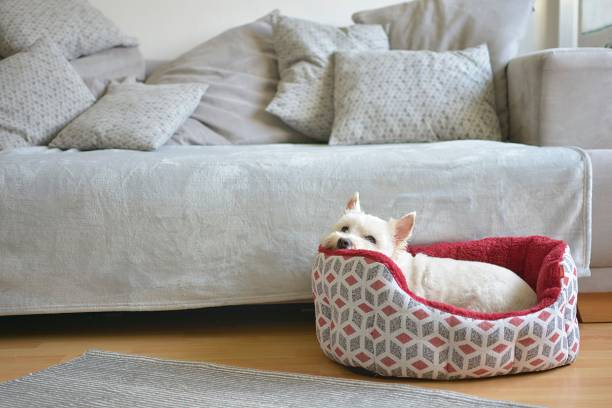Dogs of all ages like to occasionally scratch at their bed, whether they do so lightly or heavily. Sometimes you might even see them scrubbing at the unfinished floor. Normally, one would have this instinct.
In the wild, the ancestors of your dog frequently scratched at the ground and leaves to make a makeshift bed. They were better hidden from predators by shifting the leaves and dirt around. In hot climates, their ancestors may have also scratched at their beds to get at the cooler soil beneath by removing the warm soil and grass on top.
Dogs also use scratching to mark their territory. They mark the bed as their own by leaving a scent behind using the glands in their paws. A female dog getting ready to have puppies might also scratch as a maternal “nesting” instinct.
Common Reasons Why Dogs Scratch Their Beds
Natural Instincts
In every location, dogs dig. Dogs had to fend for themselves in the wild before they were domesticated. They would gnaw at mounds of dirt, leaves, and twigs to fashion the ideal bed or hiding place. Generations of people have inherited this quality. Your dog may also engage in this behavior after urinating by digging around the area and covering it with dirt.
Nesting is a natural instinct that female dogs exhibit. When a pregnant dog is getting close to her due date, she starts to get ready for it just like pregnant women do! Digging holes in the wild to prepare for their puppies was a necessity for your dog’s ancestors, and this trait has been passed down. In preparation for the birth of her new children, your future mother will restlessly scratch and dig at her bed.
To Mark Territory
Dogs have scent glands on the bottom of their feet, just like cats and many other four-legged animals, and these glands release a distinctive pheromone. Your dog may use scratching to let people know they have claimed a particular bed by marking it.
Curiosity
Dogs dig in order to investigate things, which is another reason. They might dig to find something exciting they believe is under their bed’s cushions, such as some unfinished food or a toy.
Anxiety
Scratching at their bed can be seen as a coping mechanism and a way for your dog to vent their frustration if they are experiencing anxiety. Because of insufficient exercise, irregular sleeping habits, or loud noises like thunder, sirens, or engines, your dog may be experiencing anxiety. It is best to speak with your veterinarian for assistance if this is a persistent issue. They will probably advise you to give your dog more physical exercise, to touch them when they appear stressed, and if at all possible, to lessen loud noises in the area where they are.
Force of Habit
Dogs are habit-forming creatures, just like humans! Your puppy may have picked up this behavior from their mother or from other dogs living in your home. Even if they are unaware of the motivation, they still act.

Ways to Protect Your Dog’s Bed Against Scratching
Trim Your Dog’s Nails
A good manicure for your dog is always a good idea; regular nail trimming can reduce potential damage to your dog’s sleeping space. Every three to four weeks, dogs’ nails need to be trimmed. A regular trim can prevent potential furniture or hardwood floor damage, as well as help prevent their nails from becoming infected.2
After trimming your dog’s nails, you may want to gently file them to remove any remaining sharpness and stop any edges from forming.
Give Them Other Ways to Play
It may be due to a lack of stimulation if your dog’s bed-scratching behavior has evolved into a game rather than a soothing bedtime ritual.3 Try taking your dog on longer walks or providing them with toys to keep them occupied.
Calm Your Anxious Dog
Find strategies to help your dog cope with their anxiety if it is the main cause of their bed-scratching and digging habits. There is frequently too much energy in an anxious dog. You can lessen your dog’s anxiety by:
- Exercise: Much like humans, exercise is incredibly beneficial for boosting cognitive function and lowering stress. Going for a walk with your dog or playing with him can help you feel less anxious.
- Swaddling a baby is similar to the idea behind calming coats. The torso of your dog is soothed by a calming coat’s light, continuous pressure.
- Our dogs are very similar to us in many ways, says massage. Like us, they enjoy getting massages. Massage aids in releasing tight muscles and calming them, which are both common effects of anxiety. Give them lots of hugs, talks, and physical contact during this time, so they’re much calmer when they go to bed.4
For advice on how to reduce your dog’s anxiety, consult a veterinarian in your area.
Invest in a More Durable Bed
Your dog might not always be the issue; rather, it might be the bed they’re using. Cheap beds made of fabric and stuffing aren’t made to hold up to a dog that digs and scratches at night. For this reason, buying a bed with a sturdy cover is essential. A comfortable bed might also reduce the amount of digging they have to do to get cozy. For you and your dog, it might be a good idea to spend money on an orthopedic or memory foam dog bed in that case.
Conclusion: It Depends
The likelihood is that your dog’s propensity to scratch their bed before falling asleep is completely normal, and the behavior is probably an instinct they inherited.
Your dog’s instinct to scratch and circle in its bed for protection and comfort comes from the countless years that its ancestors lived in the wild. If the scratching is persistent or doesn’t cause your dog to fall asleep, you should see a veterinarian because it could be an indication of anxiety or another neurological condition.
